英语单项知识的讲解与练习(85)
英语单项知识的讲解与练习(112)

英语单项知识的讲解与练习(112)556. deliver的用法delivervt.接生(小孩);递送;发表(演说等)例句:①The mailman delivers letters and parcels every morning.邮差每天早晨递送信件和包裹。
②He delivered a long prose.他发表了一篇冗长乏味的演讲。
③We deliver the goods in batches.我们分批交付货物。
④Education delivered him from ignorance.教育把他从无知中解救出来。
⑤She delivered twins in the evening.晚上她生了一对双胞胎。
短语:deliver a baby 接生小孩;生小孩; deliver sth. to...把某物送到…; express delivery 快递; on delivery送达时;货到时; deliver on one's pledge (or promise)履行诺言;deliver oneself of an opinion发表意见;deliver a blow at one's enemy给予敌人一个打击;deliver as 作为…播送;deliver sb from danger 救某人出险;deliver sb from pains 解除某人的痛苦;deliver sb into the hand of the police 把某人引渡给警察;deliver sb of fear 消除某人的恐惧;deliver on 履行,实行;deliver over to the police 把(某人)交给警察;deliver oneself to 向…投案自首;deliver to sb's house 送到家;用法:①deliver可用作不及物动词,也可用作及物动词。
英语单项知识的讲解与练习(4)
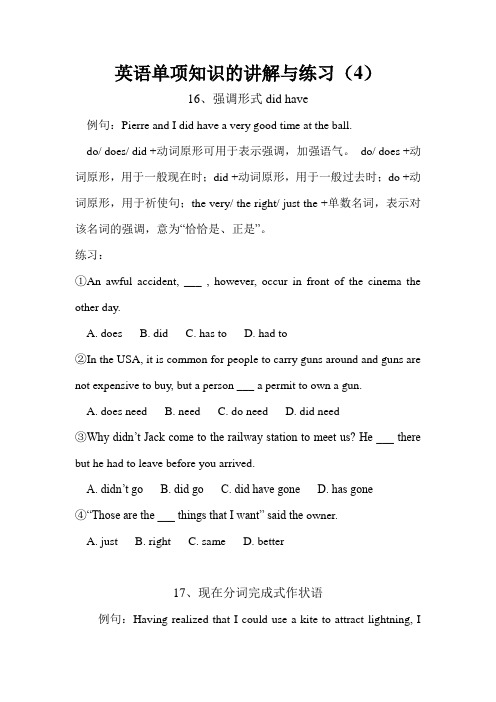
英语单项知识的讲解与练习(4)16、强调形式did have例句:Pierre and I did have a very good time at the ball.do/ does/ did +动词原形可用于表示强调,加强语气。
do/ does +动词原形,用于一般现在时;did +动词原形,用于一般过去时;do +动词原形,用于祈使句;the very/ the right/ just the +单数名词,表示对该名词的强调,意为“恰恰是、正是”。
练习:①An awful accident, ___ , however, occur in front of the cinema the other day.A. doesB. didC. has toD. had to②In the USA, it is common for people to carry guns around and guns are not expensive to buy, but a person ___ a permit to own a gun.A. does needB. needC. do needD. did need③Why didn’t Jack come to the railway station to meet us? He ___ there but he had to leave before you arrived.A. didn’t goB. did goC. did have goneD. has gone④“Those are the ___ things that I want” said the owner.A. justB. rightC. sameD. better17、现在分词完成式作状语例句:Having realized that I could use a kite to attract lightning, Idecided to do an experiment.Having realized是现在分词的完成式,在句中作状语,表示该动作发生在谓语动词的动作之前,相当于When I had realized that …;现在分词作状语,表示时间、原因、条件、结果,相当于一个状语从句。
英语单项知识的讲解与练习(92)

英语单项知识的讲解与练习(92)英语单项知识的讲解与练习(92)456. carve的⽤法carve刻、雕刻。
例句:①The statue was carved out of marble.这座雕像是⽤⼤理⽯雕刻的。
②He carved me some very nice pieces of chicken.他为我切了⼏块很好的鸡⾁。
③It's your turn to carve the meat.该你来把⾁切开了。
④He carved me a piece from a chicken. 他给我切⼀块鸡⾁。
短语:carve out one’s/ a way 开辟道路;carve up⽠分、划分;carve one’s name on a pen把名字刻在钢笔上;carve for oneself ⾃由⾏动;carve sth from ivory ⽤象⽛雕成某物;carve in gold 英名永垂;carve sth in marble〔metal, stone, wood〕⽤⼤理⽯〔⾦属,⽯头,⽊头〕雕成某物;carve into equal districts 划分成⼤⼩相同的⾏政区;carve sth out of a potato 把马铃薯雕成某物;⽤法:①carve有两个意思,⼀是“切,切碎”,如切⾁、切菜等,引申可指“⽠分”。
⼆是“雕刻”,即使⽤⼑、凿等⼯具细⼼熟练地、有⽬的地雕刻出图案、画像或⽂字。
②carve可⽤作不及物动词,也可⽤作及物动词。
⽤作及物动词时,可接简单宾语(可以是雕刻⽤的⽊、⽯; 也可以是⽤雕刻的对象如花朵等),也可接双宾语,其间接宾语可以转换为介词for的宾语。
练习:①The ___ pot showed that the ___ of human kind in China is very high in ancient ___.A. carve; civilize; timesB. carved; civilization; timesC. carved; civilized; timesD. carved; civilization; time②The worker carved a big Chinese character ___ a piece of stone.A. inB. toC. onD. into③The mother took a cake out of the bag and her children ___ immediately.A. carved out itB. carved it outC. carved up itD. carved it up④The soldiers had much difficulty ___ their way and marched on.A. to carveB. in carvingC. carving457. case的⽤法case箱⼦、盒⼦、情况、状况。
英语单项知识的讲解与练习(120)
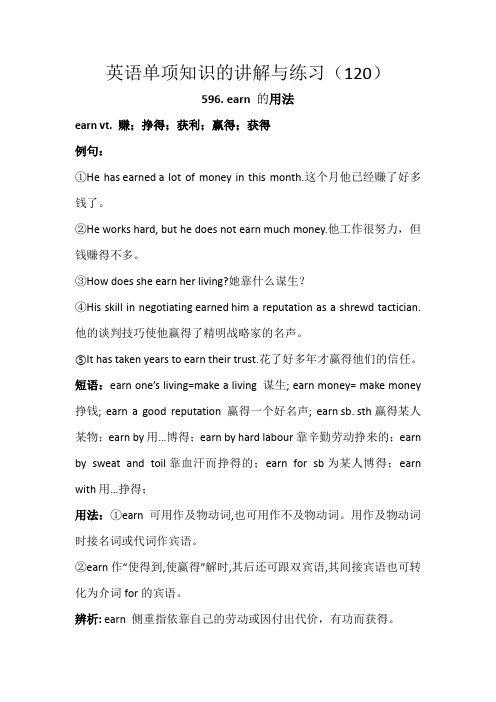
英语单项知识的讲解与练习(120)596. earn的用法earnvt. 赚;挣得;获利;赢得;获得例句:①He has earned a lot of money in this month.这个月他已经赚了好多钱了。
②He works hard, but he does not earn much money.他工作很努力,但钱赚得不多。
③How does she earn her living?她靠什么谋生?④His skill in negotiating earned him a reputation as a shrewd tactician.他的谈判技巧使他赢得了精明战略家的名声。
⑤It has taken years to earn their trust.花了好多年才赢得他们的信任。
短语:earn one’s living=make a living 谋生; earn money= make money 挣钱; earn a good reputation 赢得一个好名声; earn sb. sth赢得某人某物;earn by 用…博得;earn by hard labour 靠辛勤劳动挣来的;earn by sweat and toil 靠血汗而挣得的;earn for sb 为某人博得;earn with 用…挣得;用法:①earn可用作及物动词,也可用作不及物动词。
用作及物动词时接名词或代词作宾语。
②earn作“使得到,使赢得”解时,其后还可跟双宾语,其间接宾语也可转化为介词for的宾语。
辨析: earn 侧重指依靠自己的劳动或因付出代价,有功而获得。
obtain 着重指通过巨大努力、要求得到所需或盼望已久的东西。
acquire书面用语,强调通过不断地、持续地努力而获得某物,也指日积月累地获得。
get一般用语,使用较广。
可指以任何方式得到某物,也不一定要经过努力。
gain侧重指经过努力或有意识的行动而取得某种成就,或指获得某种利益或好处。
Unit 1 Grammar 知识点讲解练习(解析版)
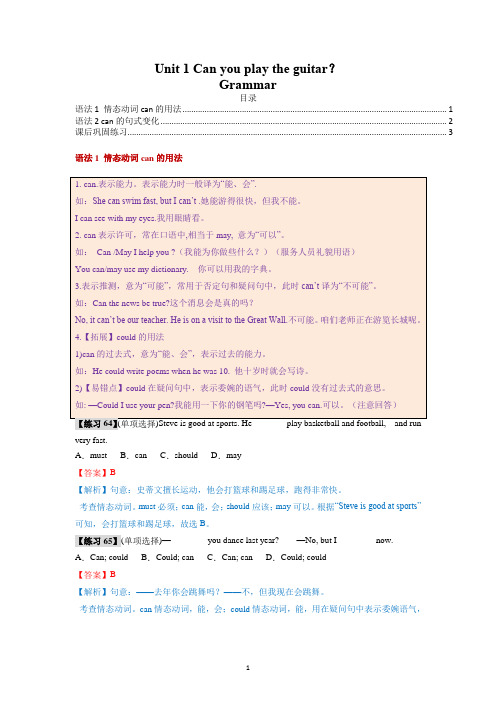
Unit 1 Can you play the guitar?Grammar目录语法1 情态动词can的用法 (1)语法2 can的句式变化 (2)课后巩固练习 (3)语法1 情态动词can的用法very fast.A.must B.can C.should D.may【答案】B【解析】句意:史蒂文擅长运动,他会打篮球和踢足球,跑得非常快。
考查情态动词。
must必须;can能,会;should应该;may可以。
根据“Steve is good at sports”可知,会打篮球和踢足球,故选B。
【练习65】(单项选择)—________ you dance last year? —No, but I ________ now.A.Can; could B.Could; can C.Can; can D.Could; could【答案】B【解析】句意:——去年你会跳舞吗?——不,但我现在会跳舞。
考查情态动词。
can情态动词,能,会;could情态动词,能,用在疑问句中表示委婉语气,也可表示过去的能力,第一空表示过去的能力用could,第二空是肯定句,有时间状语now 用can,故选B。
【练习66】(单项选择)Tom can’t play basketball on school days, but he ________ play it on weekends.A.must B.can C.have to D.should【答案】B【解析】句意:汤姆不能在上学的日子打篮球,但他可以在周末打。
考查情态动词。
must必须、一定;can可以、能够;have to不得不;should应该。
由转折词but可知,前后句之间表达的应是转折关系,前面说不能在上学的日子打篮球,则后面应该是说可以在周末打,因此can符合题意,故选B。
语法2 can的句式变化Bill ________ ________ the piano well.【答案】can play【解析】句意:比尔钢琴弹得很好。
中考英语单项选择题型命题规律及例题练习(含答案)

中考英语单项选择题型命题规律及例题练习(含答案)河北中考单项选择的设题形式为单句或对话形式。
考点设置如下:一、必考点:代词、介词、连词、形容词及副词比较等级、动词短语(以put,turn,look,动词+up,动词+for,动词+out等短语为主)、情态动词、时态(现在完成时、过去进行时、一般将来时、一般过去时、一般现在时、现在进行时等)、被动语态(一般现在时、一般过去时、一般将来时)。
二、轮考点:冠词、名词词义辨析、动词不定式、宾语从句、动词词义辨析(实义动词和感官动词交替考查)、形容词辨析、感叹句、there be句型、how词组、并列连词。
三、未考点:数词、非谓语动词中的分词和动名词、祈使句、倒装句、情景交际和图识标志。
【命题趋势及预测】预测2020年河北中考单项选择题型考查的小题数仍为10小题。
动词时态为重要考点,预计会有2—3题,动词短语1题,被动语态1题,代词1题,介词1题,其他考点随机分布。
,解题方法与技巧近几年来河北的单项选择题减少了对语法结构的考查,增加了对语境的考查,采取语义、语法相结合的方式,题目覆盖面广、灵活多样、交际性强,体现了新课标中提倡交流、强调运用、鼓励创新的理念。
下面以常见的几种解题技巧对此进行讲解剖析。
方法一:理清句意选名词( )(2019河北中考)I like this song.It's by one of my favorite ________.A.singers B.dancers C.painters D.writers【解析】A考查名词辨析。
句意:我喜欢这首歌,它是我最喜欢的一个歌手唱的。
singer意为“歌手”,符合句意。
dancer意为“舞蹈演员”;painter意为“画家”;writer意为“作家”,均与句意不符。
故选A。
【现学现用】( D )(2019江西中考)My daughter helps me cook,but she isn't old enough to be left alone in the ________.A.bedroom B.classroomC.lab D.kitchen方法突破:最近几年河北中考对名词的考查,不再局限于名词的语法,而重点考查名词在句子中的具体运用。
英语单项知识的讲解与练习(99)五篇

英语单项知识的讲解与练习(99)五篇第一篇:英语单项知识的讲解与练习(99)英语单项知识的讲解与练习(99)plete的用法complete完全的、彻底的、完结的、完成、结束。
例句:①We'll certainly set up a complete modern industrial system.我们一定要建立一个完整的现代化工业体系。
②When the experiment is complete, include your findings ina report.试验完成後,请把结果写入报告。
③By their joint efforts they managed to complete the project on time.他们通过共同努力总算按时完成了计划。
④A second child would complete their family.第二个孩子使他们的家更加完美了。
短语:complete doing something 完成某事;He is a complete stranger to me.我根本不认识他;be complete with 包括、连同;completely 完全地;complete in… 算完整;complete with 配有全部…的;complete without 不包括,没有…在内;用法:①complete作形容词时,基本意思是“完整的”“完全的”“彻底的”,指从量上来考虑“完全”,有完结、无可复加的意思;也可表示“完成的”“结束的”,指完成既定的或预定的任务;还可表示“完美的”“圆满的”,强调整体,只修饰单数名词,尤其是抽象名词。
②complete在句中可用作定语、表语或补语。
③complete作“完全的”解时,无比较级和最高级,也不可用more 和very修饰。
作“完整的”“全部的”解时,可用于比较级more complete和最高级most complete。
英语单项知识的讲解与练习(114)

英语单项知识的讲解与练习(114)566. detail 的用法detail 详细例句:①The full details of the agreement haven't been made public.协议的细节尚未公布。
②He told us the accident in detail.他详细地把事故讲给我们听。
③Could you detail all your expenses on this form?请把你的各项开支列在这张表格上,好吗?④Please detail the characteristics of the machine.请详细说明该机器的性能。
短语:in detail 详细地;detail something to somebody 详细地把某事告诉某人;go into detail/ details叙述详情;an eye for detail 明察秋毫;in complete detail 十分详细;in full detail 详尽地;a matter of detail 一桩琐事;detail by detail 逐一;details of…的详细情况;用法:①detail用作及物动词,后面可接名词作宾语,宾语后可加介词短语、副词、副词短语作状语,宾语后还可接以动词不定式充当补足语的复合宾语。
②detail的过去分词detailed意为“详细的,仔细的”,常用作形容词在句中作定语,间或也用作表语。
③in detail,这里detail用的是单数,go into detail(s)这里单复数都可以,但是一般多是用单数形式,习惯用复数形式的是go intopersonal details;④in more detail比more in detail 用法普遍,同理in less detail比less in detail用法更为常见。
练习:(1). 单项填空:①Some of the passengers told the reporters about their ___ in the burning train.A. detailsB. tripsC. eventsD. experiences②I’m ___ to go and nothing will stop me.A. detectedB. detailedC. destroyedD. determined③Study the contract ____________ before signing.A. in detailB. in detailsC. at detailD. at details④Editing requires great _____.A. attentions to detailB. attention to detailC. attention to detailsD. attentions to details(2). 用detail的适当短语填空:①Editing requires great _____________.②Study the contract ____________ before signing.③For ______________, contact the personnel department.567. develop的用法develop发展、开发、冲洗(照片)。
英语单项知识的讲解与练习(71)
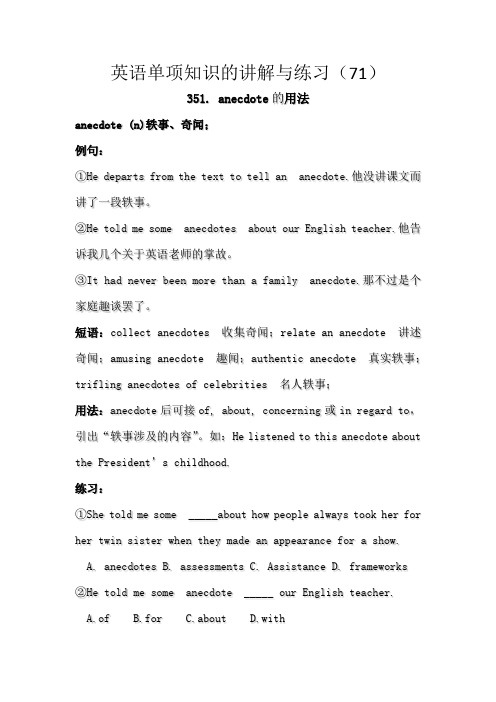
英语单项知识的讲解与练习(71)351. anecdote的用法anecdote (n)轶事、奇闻;例句:①He departs from the text to tell an anecdote.他没讲课文而讲了一段轶事。
②He told me some anecdotes about our English teacher.他告诉我几个关于英语老师的掌故。
③It had never been more than a family anecdote.那不过是个家庭趣谈罢了。
短语:collect anecdotes 收集奇闻;relate an anecdote 讲述奇闻;amusing anecdote 趣闻;authentic anecdote 真实轶事;trifling anecdotes of celebrities 名人轶事;用法:anecdote后可接of, about, concerning或in regard to,引出“轶事涉及的内容”。
如:He listened to this anecdote about the President’s childhood.练习:①She told me some _____about how people always took her for her twin sister when they made an appearance for a show.A. anecdotesB. assessmentsC. AssistanceD. frameworks②He told me some anecdote _____ our English teacher.A.ofB.forC.aboutD.with③He has a talent _____ recollection and anecdote.A.ofB.forC.aboutD. in④He also serves up by far the best anecdote _____the real workings of state capitalism.A.ofB.forC.overD.about352.applicant的用法applicant (n) 申请人、请求者;例句:①He gave every new applicant the once-over.他匆匆地看一下每一个新来的申请人。
英语单项知识的讲解与练习(26)
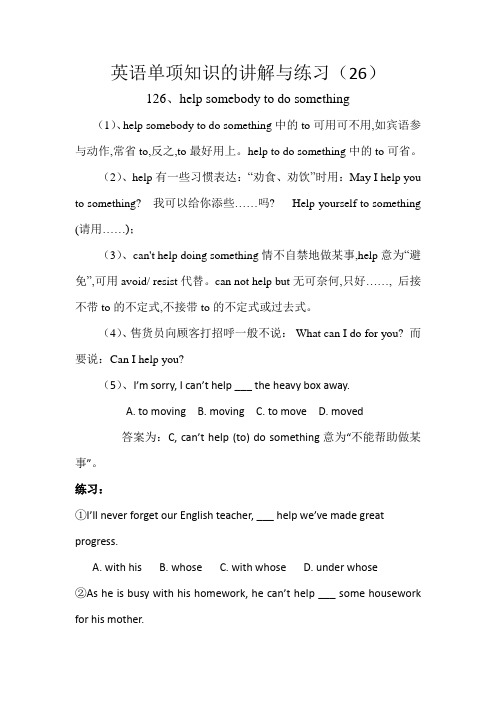
英语单项知识的讲解与练习(26)126、help somebody to do something(1)、help somebody to do something中的to可用可不用,如宾语参与动作,常省to,反之,to最好用上。
help to do something中的to可省。
(2)、help有一些习惯表达:“劝食、劝饮”时用:May I help you to something?我可以给你添些……吗?Help yourself to something (请用……);(3)、can't help doing something情不自禁地做某事,help意为“避免”,可用avoid/ resist代替。
can not help but无可奈何,只好……, 后接不带to的不定式,不接带to的不定式或过去式。
(4)、售货员向顾客打招呼一般不说:What can I do for you? 而要说:Can I help you?(5)、I’m sorry, I can’t help ___ the heavy box away.A. to movingB. movingC. to moveD. moved答案为:C, can’t help (to) do something意为“不能帮助做某事”。
练习:①I’ll never forget our English teacher, ___ help we’ve made great progress.A. with hisB. whoseC. with whoseD. under whose②As he is busy with his homework, he can’t hel p ___ some housework for his mother.A. doingB. doC. doesD. did③Do you think I could borrow your book? ___.A. Yes, you may borrowB. Yes, you couldC. Yes, help yourself to itD. Yes, go on④Recently I have been busy with a paper o n pollution, so I can’t help ___ work at home.A. doingB. to doC. to makeD. making⑤While shopping, people sometimes can't help into buying something they don't really need.A. to persuadeB. persuadingC. being persuadedD. be persuaded⑥I’m in trouble. Can’t you help me ___?A. with itB. dealing with itC. out from itD. out⑦The book is ___ to our English study.A. very helpfulB. of great helpC. a great helpD. of a great help127、hit somebody on the headhit somebody on the nose,类似动词: pat, hit, strike, beat, touch, take, catch等. hit somebody on the jaw(下巴),ear, shoulder, nose, neck, forehead/ in the eye, mouth, stomach, face (在这一结构中,该名词如果是指身体表面部位的一般用on,如果指身体表面那些柔软易凹陷部位或身体内脏的用in。
英语单项知识的讲解与练习(104)
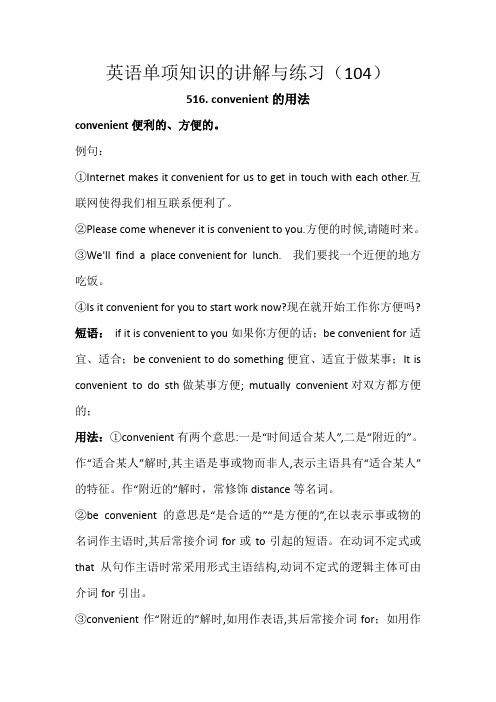
英语单项知识的讲解与练习(104)516. convenient的用法convenient便利的、方便的。
例句:①Internet makes it convenient for us to get in touch with each other.互联网使得我们相互联系便利了。
②Please come whenever it is convenient to you.方便的时候,请随时来。
③We'll find a place convenient for lunch. 我们要找一个近便的地方吃饭。
④Is it convenient for you to start work now?现在就开始工作你方便吗? 短语:if it is convenient to you如果你方便的话;be convenient for适宜、适合;be convenient to do something便宜、适宜于做某事;It is convenient to do sth做某事方便; mutually convenient对双方都方便的;用法:①convenient有两个意思:一是“时间适合某人”,二是“附近的”。
作“适合某人”解时,其主语是事或物而非人,表示主语具有“适合某人”的特征。
作“附近的”解时,常修饰distance等名词。
②be convenient的意思是“是合适的”“是方便的”,在以表示事或物的名词作主语时,其后常接介词for或to引起的短语。
在动词不定式或that从句作主语时常采用形式主语结构,动词不定式的逻辑主体可由介词for引出。
③convenient作“附近的”解时,如用作表语,其后常接介词for;如用作定语修饰distance,须用介词from短语,表示“离…近”。
练习:①If it is ___ you today, please post the letter for me on your way home.A. convenient withB. convenient toC. convenient forD. convenient on②Come and see me whenever ___.A. you are convenientB. you will be convenientC. it is convenient to youD. it will be convenient to you③If it is quite ___ to you, i’ll visit you next Tuesday.A. convenientB. fairC. easyD. comfortable④Our new house is very ___ for me as I can get to the office in five minutes.A. adaptableB. comfortableC. convenientD. available517. convey的用法convey(vt)转达、传达、运送、传播;例句:①I find it hard to convey my feelings in word.我觉得难以用言语表达我的感情。
英语单项知识的讲解与练习(90)
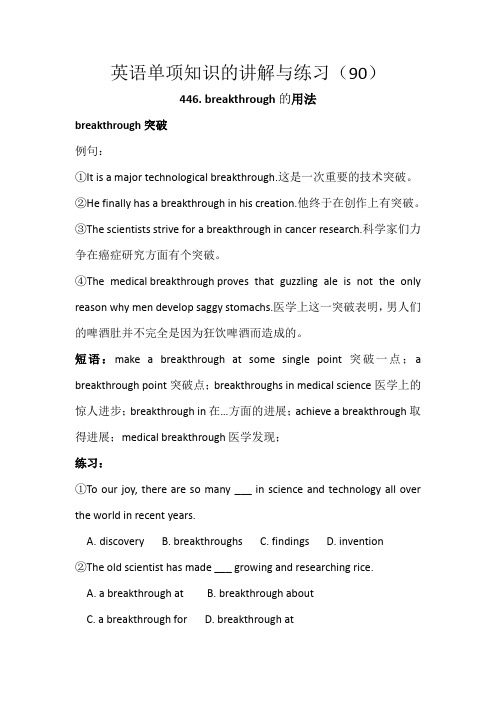
英语单项知识的讲解与练习(90)446. breakthrough的用法breakthrough突破例句:①It is a major technological breakthrough.这是一次重要的技术突破。
②He finally has a breakthrough in his creation.他终于在创作上有突破。
③The scientists strive for a breakthrough in cancer research.科学家们力争在癌症研究方面有个突破。
④The medical breakthrough proves that guzzling ale is not the only reason why men develop saggy stomachs.医学上这一突破表明,男人们的啤酒肚并不完全是因为狂饮啤酒而造成的。
短语:make a breakthrough at some single point突破一点;a breakthrough point突破点;breakthroughs in medical science医学上的惊人进步;breakthrough in 在…方面的进展;achieve a breakthrough 取得进展;medical breakthrough 医学发现;练习:①To our joy, there are so many ___ in science and technology all over the world in recent years.A.discoveryB. breakthroughsC. findingsD. invention②The old scientist has made ___ growing and researching rice.A. a breakthrough atB. breakthrough aboutC. a breakthrough forD. breakthrough at③Scientists have made a great ___ in the treatment of cancer.A. principleB. breakthroughC. conclusionD. introduction④The doctors in that hospital made lots of ___ in medical science.A.breakthroughB.break throughC.breakthroughsD.break throughs447. breath的用法breath呼吸、气息。
人教版新目标英语七年级下册语法知识讲解和 习题汇编(含答案 )
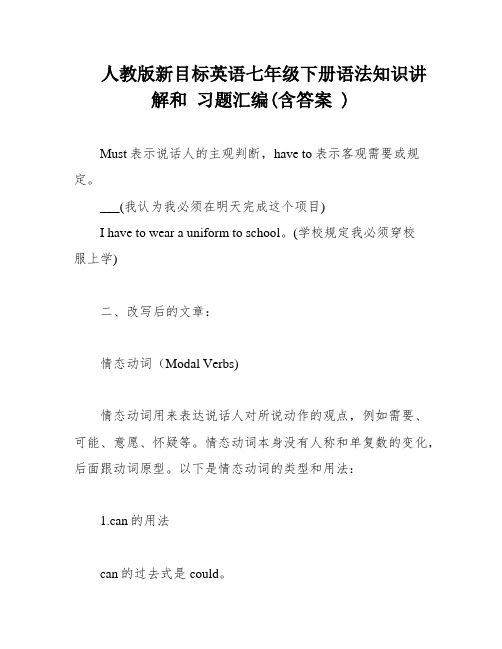
人教版新目标英语七年级下册语法知识讲解和习题汇编(含答案 )Must表示说话人的主观判断,have to表示客观需要或规定。
___(我认为我必须在明天完成这个项目)I have to wear a uniform to school。
(学校规定我必须穿校服上学)二、改写后的文章:情态动词(Modal Verbs)情态动词用来表达说话人对所说动作的观点,例如需要、可能、意愿、怀疑等。
情态动词本身没有人称和单复数的变化,后面跟动词原型。
以下是情态动词的类型和用法:1.can的用法can的过去式是could。
肯定式:主语+can/could+动词原型否定式:主语+___动词原型疑问式:Can/Could+主语+动词原型…?回答:肯定回答用Yes,否定回答用No。
a。
表示能力:例如我们会说英语和中文。
例如:___.b。
表示许可:例如你不能在走廊打架。
例如:___.c。
表示请求:例如你能把我的书递给我吗?例如:Can you pass me my book?注意:could也可以表示请求,但语气更委婉,回答仍然是___。
例如:Could you please tell me how to get to the museum?回答:Yes。
I can.2.may的用法may的过去式是might。
肯定式:主语+may/might+动词原型否定式:主语+may/might+not+动词原型疑问式:___动词原型…?回答:肯定回答用Yes,否定回答用No。
a。
表示许可,语气比can更正式和委婉。
例如:May I ___?b。
表示可能性,意思是也许、可能,但不确定。
例如:That may be true。
I am not sure.注意:maybe和___都可以表示“也许”,但maybe位于句首,___位于句中作副词。
例如:It may be his book.Maybe it is his book.3.must的用法肯定式:主语+must+动词原型否定式:主语+mustn't+动词原型疑问式:Must+主语+动词原型…?回答:肯定回答用Yes,否定回答用No。
译林版英语七年级上册知识点讲解练习

7上Unitl知识点讲解和练习【单元学习重点和要求】一、语音1.单词重读'welcome 'secondary 'swimming 'racket'lunchtime 'badminton 'tennis 'breakfast2.不完全爆破ba(d)minton baske(t)ball brea(k)fast bla(ck) hair foo(t)ball 3.句子重音和语调Are you my / master? Yes, I \ am.What's your \ name? My name’s \ Daniel.二、词汇4.单词welcome secondary racket tennis swimming badminton football lunchtime field court boots swimsuit5.词组come from 从……来,来自于……be born 出生play football 踢足球at school 在上学,在求学work hard 努力工作;努力学习enjoy doing sth 爱好(喜欢)做某事tennis racket 网球拍football field 足球场tennis court 网球场football boots 足球鞋swimming pool 游泳池have breakfast 吃早饭/餐watch TV every day take a bus afterschool half an hour be good at theWorld Cup the Computer Club playcomputer games the Music Clublook for things on the Internet 网上搜寻/浏览三、日常用语Hi, I’m Sandy. What’s your name? 你好,我叫桑迪。
Unit7核心知识讲练-八年级下册英语单元核心知识讲练(牛津译林版)

八年级下册英语单元核心知识讲练Unit 7 International charities 核心知识讲练【讲练01】【原文】I’m too weak to walk any further. 我太虚弱了,不能再往前走了。
【考点①】too adj/adv to do sth 太……而不能做某事;eg: I’m too tired to carry the box. / She walked too slowly to catch the last bus.too adj/adv to do sth可以转化成not adj/adv enough to do sth(不是足够……能做某事),也可以转化成so adj/adv that从句(如此……以至于……)。
eg: My sister is too young to dress herself.可以转化成My sister is not old enough to dress herself.也可以转化成My sister is so young that she can’t dress herself.【考点②】far adj/adv farther更远farthest最远eg: jump fartherfurther更进一步的furthest最大程度上eg: further study,further education【考点③】any修饰比较级;eg:Are you feeling any better today?【练习A】1 Qinling Four Treasures are ________ lovely ________ all of us like them.A.too; to B.enough; to C.as; as D.so; that2 The door is ________ narrow for such a fat man ________.A.too; to go B.enough; to go C.to; to go to D.too; to go through.3 The film is ________ difficult for me _________.A.so;that understand B.too;to understand itC.not enough;to understand it D.too;to understand4 —Is your mother any ________ today?—Yes, she looks a little ________.A.well; well B.well; better C.better; better D.well; good5 Every year a lot of students go to other countries for (far) study.6 As the old saying goes, “The higher you climb, the (far) you’ll see.”7 —Jim, do you know who lives (far) in our class?—I think Kate does.【练习B】8 The tent is _______ for a family of three _______.A.big enough; to live in it B.enough big; to live in itC.big enough; to live in D.enough big; live in9 — Don’t punish(惩罚)him. He’s only two years old.— A kid is never ________ learn good manners.A.too old to B.too young to C.old enough to D.young enough to答案:1D 2D 3D 4 C 5 further 6 farther 7 farthest 8 C 9 B【讲练02】【原文】e on, Eddie. We only have five kilometres left. 来吧,艾迪。
Unit1知识点详细讲解练习-人教版英语七年级下册

Unit 1 Can you play the guitar?Section A知识精讲知识点1 ①Can you ②play the guitar?(课本标题)①can情态动词(能够,会)Can you do sth?Yes,sb can./No,sb can’t.②play +the +乐器play+球、棋知识点2 做某事的能力1a①sing②swim=go swimming③dance---dancer(动词+er---名词职业)④draw⑤play chess⑥speak Englishspeak speak+语言说某种语言say say+内容,say sth. to sb. 对某人说某事talk①talk to sb. 向某人说①talk with sb. 和某人交谈①talk about sth. 谈论某事tell①tell sb.(not) to do sth. 让某人(不要)做某事①tell stories⑦play the guitar Language Goal:I ①want to ②join ③the art club.①want(sb)to do想要某人做want to do想要做②join参加指加入某一社团或组织,并成为其中的一员③注意:俱乐部前有the(语法填空题注意)知识点3 俱乐部的表达2aEnglish/music/art/chess/swimming club注意:club前用动词ing形式知识点4 2dJane:Hi,Bob. What club do you want to join?Bob:I want to ①join a sports club.Jane:Great!What sports can you play?Bob:Soccer.Jane:So you can join the soccer club.Bob:②What about you?You're very good at telling stories. You can join the story telling club. Jane:③Sounds good. But I like to draw,too.Bob:Then join two clubs,the story telling club and the art club!Jane:OK,④let's join now!①join a sports club加入运动娱乐部(注意前面冠词为a)②what about=how about +doing...怎么样?what about you?你呢③sound 感官动词听起来,后+形容词④Let’s do 让我们...知识点5 Grammar focuscan't=cannotCan you swim?Yes,I can./No,I can't.Can he play chess? Yes,he can./No,he can't.Can you and Tom play chess?Yes,we can./No,we can't.Can Jane and Jill swim?Yes,they can./No,they can't.What can you do?I can dance./I can't sing.What club do you want to join?We want to join the chess club.知识点6 3b①Students Wanted for ②School ShowWe want students for the school show. Can you sing ③or dance ? Can you play the guitar? Can you tell stories?Please ④talk to Mr. Zhang after school.①sb. wanted...招聘②school show学校演出③肯定句表并列用and,否定、疑问句表并列用or④talk to/with sb. about sth.牛刀小试用所给单词的正确形式填空1.Listen! He can _________ (speak) much French.2.Our English teacher often tells us ________ (story) in his class.3.I am good at ________ (make) model planes.4.Tony can _______ (dance).5.Mo Yan is a famous ________ (write).6.Bob ________ (can not) write.7.Can you ________ (go) to the park with me tomorrow?8.—Can your friends ________ (speak) English?—Yes, they can.9.I want to talk to ________ (she).10.David wants to join the _____________ (swim) club.Section B知识点7 乐器的表达1aplay the piano/violin/guitar/drums(注意打鼓用复数)知识点8 2aMy name's Alan. ①I'm in the school music club. I can play the guitar and the piano. I can sing and dance, ②too.Hi,I'm Ma Huan. I can play ping-pong and chess. I like to talk and ③play games with people. Hello,I'm Peter. I ④like to play basketball. I can speak English and I can ②also play soccer.①be in ...club ...俱乐部的一员②also放句中,too放肯定句句末(前面有逗号),either放否定句句末。
Unit 1 知识讲解--度八年级英语下册基础知识专项讲练(人教版)
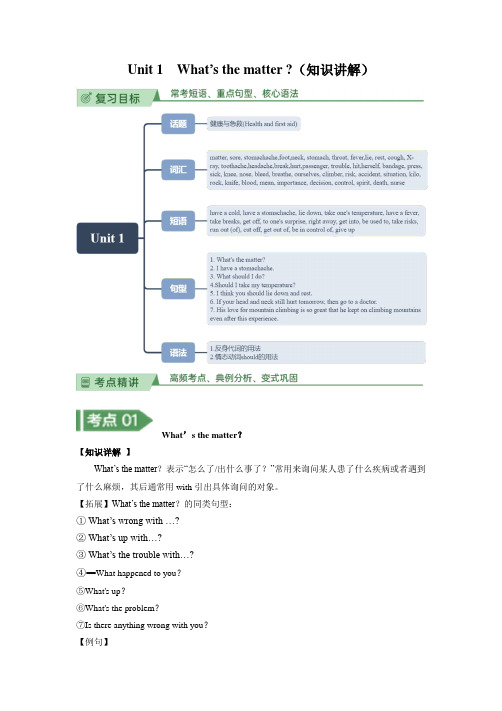
Unit 1 What’s the matter ?(知识讲解)What’s the matter?【知识详解】What’s the matter?表示“怎么了/出什么事了?”常用来询问某人患了什么疾病或者遇到了什么麻烦,其后通常用with引出具体询问的对象。
【拓展】What’s the matter?的同类句型:① What’s wrong with …?② What’s up with…?③ What’s the trouble with…?④=What happened to you?⑤What's up?⑥What's the problem?⑦Is there anything wrong with you?【例句】—What’s the matter? —Bad luck. I lost my pen.你怎么了?运气不好,我把钢笔丢了。
have a cold 表示“(患)感冒”【知识详解】have a cold 表示“(患)感冒”。
其中have用作及物动词,意为“患(病); 遭受(病痛)”,“ have a/an+疾病名称”表示患病或身体某部位不舒服,不能用于进行时态。
【拓展】表达疾病的句型① have a + 疾病例:have a cold 感冒;have a fever 发烧;have a cough 咳嗽② have a + 身体部位-ache例:have a headache 头痛;have a toothache 牙痛③ have a sore + 身体部位例:have a sore throat 咽喉痛;have a sore back 背痛④There's something wrong with sb’s +身体部位:身体某部位有毛病例:There's something wrong with my right eye.我的右眼有点毛病⑤某人hurt(s) 身体部位: 某人伤着身体某个部位了例:I hurt my foot when I played football.see sb doing / do sth【知识点详解】see sb. doing sth. “看见某人正在做某事”,强调看到的动作正在进行;see sb. do sth. “看见某人做了某事”,强调看见动作的全过程或看见动作经常发生。
Unit3知识讲解--2022-2023学年度七年级英语下册基础知识专项讲练(人教版)
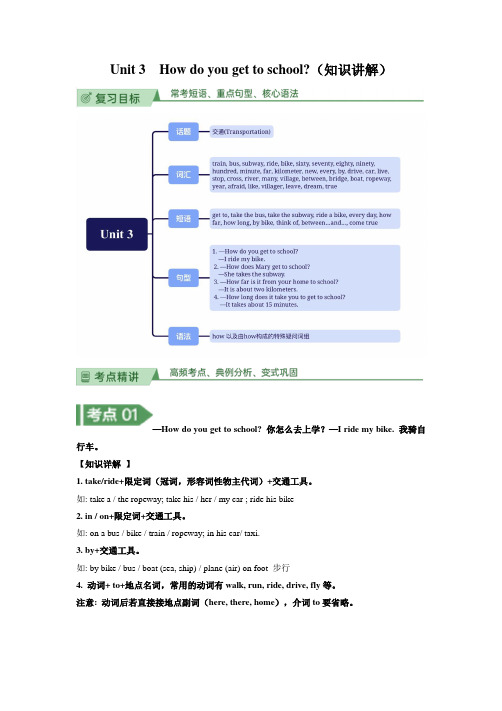
Unit 3 How do you get to school?(知识讲解)—How do you get to school? 你怎么去上学?—I ride my bike. 我骑自行车。
【知识详解】1. take/ride+限定词(冠词,形容词性物主代词)+交通工具。
如: take a / the ropeway; take his / her / my car ; ride his bike2. in / on+限定词+交通工具。
如: on a bus / bike / train / ropeway; in his car/ taxi.3. by+交通工具。
如: by bike / bus / boat (sea, ship) / plane (air) on foot 步行4. 动词+ to+地点名词,常用的动词有walk, run, ride, drive, fly等。
注意: 动词后若直接接地点副词(here, there, home),介词to要省略。
How long does it take you to get to school? 去上学花费你多久?【知识详解】how long, how far, how often的区别:1. how long 时间多久,主要对一段时间提问(for+一段时间,half+一段时间,three days, four weeks等)。
如: A: How long will he stay here? B: About two weeks.(划线提问)提问单个事物本身的长度,与距离无关。
A: How long is the ruler?2.how far询问两地之间的距离,在疑问句中一般会出现两个地点,答语常用It’s…meters/kilometers/miles/表距离的常见短语有five kilometers, ten minutes’ walk 10分钟的步行路程, three hours’ ride 3小时的车程等。
- 1、下载文档前请自行甄别文档内容的完整性,平台不提供额外的编辑、内容补充、找答案等附加服务。
- 2、"仅部分预览"的文档,不可在线预览部分如存在完整性等问题,可反馈申请退款(可完整预览的文档不适用该条件!)。
- 3、如文档侵犯您的权益,请联系客服反馈,我们会尽快为您处理(人工客服工作时间:9:00-18:30)。
英语单项知识的讲解与练习(85)421. candid的用法candid adj.无偏见的, 公正的, 坦白的, 率直的;例句:①His words are always more candied than candid.他话语中阿谀多于诚恳。
②To be perfectly candid, I think you acted foolishly.十分坦率地说,我认为你做得很愚蠢。
③He is a very candid man and never talks in a roundabout way.他生性坦直,说话办事从来不会拐弯抹角。
④Give me a candid hearing.请你公正地听我说。
短语:candid camera用来偷拍的袖珍照相机...;candid friend敢说直话的朋友(直言...;candid phonograph快相,快拍摄影...;用法:candid后接介词to或toward,表示“对某人公正”。
如:He is candid to his opponent(对手). 后接介词with,表示“对某人坦白”。
如:To be candid with you, I think you've acted foolishly. 后接介词about或in,表示“公正地办某事”。
如:He was candid about the matter.练习:①They’re interviewing three _____ for the post of sales manager.A. sponsorsB. candidatesC. advocatesD. opponents②I guess Jones didn’t have a chance to win the election. Almost all ofthe people in the city voted for his ____.A. opponentB. candidateC. colleagueD. advocate③To be candid, I don't like your hairstyle.A. opponentB. candidateC. colleagueD. advocate④I'm candid _____ a fault, not a diplomat.A.aboutB. withC. toD. in422. cling的用法cling vi.粘紧, 附着, 紧贴, 坚持(意见), 墨守(习惯);例句:①The wet clothes clung to his body.湿衣服紧贴在他身上。
②He clung to my arm.他紧抓着我的胳膊。
③Don't cling to the kerb when you're driving.不要紧贴路边开车。
④Leaf-tailed geckos cling to the trees, cloaked in green.叶尾壁虎紧贴在树上,隐藏在一片绿色之中。
短语:cling on the trees 粘在树上;cling onto one's mother 紧紧抱住妈妈;cling onto old fashioned ideas 墨守陈旧的观点;cling to one's body 紧贴于某人身上;cling to the hope 始终抱着希望;cling to one's mother's arm 紧握母亲的胳臂;cling to the wall 贴墙生长;cling tenaciously 固执己见;cling tightly 牢牢地抓住;用法:①cling的基本意思是臂状物、根须等悬着依附于某物,引申可表示固执地把持住所占有的或使用的东西,也可表示独立存在的事物所需要的支持。
②cling是不及物动词,表示“粘在一起”时,接副词together。
③cling后接介词to,表示“紧紧抓住、抱住”。
如:The child clung to its mother's arm. 表示“贴住、粘住”。
如:Wet clothes cling to the body. 表示“接近、靠近”。
如:The ship clung to the coast. 表示“依恋、怀恋”。
如:He clung to his memories of home. 表示“坚持、墨守”。
如:He clung to his own views.练习:①We should ________ our energy and youth to the development of our country.A. dedicateB. caterC. ascribeD.cling②At the party we found that shy girl ________ her mother all the time.A. depending onB. coinciding withC. adhering toD. clinging to③The cat tried to _____ the edge by its claws.A.clingB.cling toC.caterD.cater to④She _____ to the hope that her son was not dead.A.clingsB.is clingingC.clungD.was clinging423. avoid的用法avoid避免、回避。
例句:①You should avoid unnecessary repetition.你应避免不必要的重复。
②He'll grab at any excuse to avoid doing the dishes.他会随便找个借口来逃避洗碗。
③No one can avoid his own responsibility.没有人能够逃避自己责任。
短语:avoid sth by 靠…逃避某事;avoid studiously 小心回避;avoid totally 完全回避;avoid the topic 避开话题;avoid a contract 废止合同;avoid making a reply 避而不答;avoid mistakes 避免错误;用法:①avoid后可接动名词,不可接不定式。
如:You had better avoid reading in the train.你最好避免在地铁上阅读。
句中的reading不可改成to read。
②avoid指“避免(成功)”,若是企图避免却失败的,不可用avoid。
如:I avoided meeting him, but somehow bumped against him.句中我企图避免见他,却还是撞上了,不可单用avoid,需把avoided改成tried to avoid。
③avoid的基本意思是避开不希望发生的、不愿忍受的或不想遇上的事情。
有时含有先见之明的意味。
引申可表示“预防”或“防止”发生某事物。
avoid所表达的意图总是达成的,否则就须用try。
④avoid是及物动词,可接名词、代词或动名词作宾语,不接动词不定式,可用于被动结构。
avoid, escape, miss表示“避免、回避、错过”等意时,后需要接动名词。
练习:①We can’t understand why he avoided ___ to us.A. to speakB. speechC. having spokenD. speaking②They are all afraid of him and try their best to avoid ___ his name.A. to mentionB. mentioningC. mentionD. to be mentioning③CCTV says that a storm will hit our city. In order to avoid ___, we must take our raincoats.A. to catchB. catchingC. to be caughtD. being caught④If your race car isn’t insured, you may ___ losing everything when it hits something solid.A. delayB. denyC. avoidD. risk424. balance 的用法balance n. 天平;平衡;结余,余额; v.平衡;权衡例句:①The girl lost her balance and fell off the balance beam.小女孩失去了平衡,从平衡木上摔了下来。
②Great care must be taken in the use of the balance.这种天平使用时必须十分当心。
③The company will lay off workers to balance the budget.这家公司会裁员,以平衡预算。
④The dancer could balance on one toe.舞蹈演员可以用一个脚趾平衡。
短语:on/ in balance总的说来;keep/ lose one’s balance 保持(失去)平衡、保持冷静(慌乱);balance with/ against something使……平衡(相当);a balance between meats and vegetables肉和蔬菜之间的平衡;out of balance 不平衡; a sense of balance 平衡感; bank balance 银行余额; balance of trade贸易差额; keep balance of nature保持生态平衡; balance against 相比较,相抵消;balance against the other 把一种与另一种进行比较;balance good qualities against shortcoming 以优点抵消缺点;balance A by B 使甲乙两方均衡;balance in one's choice 权衡利弊;balance in power 势均力敌;balance A with B 使甲乙两方均衡;用法:①balance用作名词的基本意思是“平衡,对比”,引申可表示“调和,均势”,还可表示思想或情绪上的稳定、镇定、沉着,有时还可表示重量、力量或数量上偏重,作此解是不可数名词,但其前可加不定冠词。
